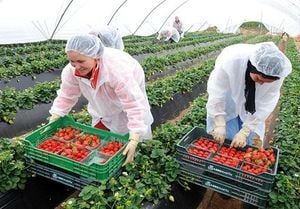In 2025, the Seguridad Social in Spain is set to provide a significant financial lifeline for homemakers who have not contributed to the social security system. This initiative allows eligible individuals to receive a non-contributory pension that can reach up to 500 euros monthly, aimed specifically at those who have dedicated their lives to domestic responsibilities without formal recognition through contributions.
The new pension scheme is particularly designed for individuals over the age of 65 who find themselves in vulnerable economic situations, having not accumulated sufficient contributions to qualify for a contributory pension. The program is a recognition of the hard work that homemakers do, often unnoticed and unappreciated, and it aims to provide them with a much-needed financial safety net.
To qualify for this non-contributory pension, applicants must meet several specific requirements. Firstly, they must demonstrate an annual income of less than 7,250.60 euros. Additionally, they must have legally resided in Spain for a minimum of 10 years, with at least two of those years being consecutive and immediately preceding the application date.
Moreover, the income limits adjust according to the number of cohabitants. For example, if the applicant lives with two other people, the income threshold rises to 12,326.02 euros annually. For three cohabitants, the limit is 17,401.44 euros, and for four, it is 22,476.86 euros annually. In households with children, the allowances increase further: two cohabitants with children have an income cap of 30,815.05 euros, three cohabitants with children can earn up to 43,503.60 euros, and four cohabitants with children can earn as much as 56,192.15 euros annually.
As for the amount of aid, the non-contributory pension is set annually in the General State Budgets. For the year 2024, the amount was established at 7,250.60 euros, which translates to a monthly pension of 517.90 euros, payable in 14 installments. While this figure is based on 2024 data, it serves as a reference point for what beneficiaries might expect in 2025, although slight variations may occur.
Applying for this pension is a straightforward process, although it does require specific documentation. Applicants need to obtain the application form, which can be found on the IMSERSO website or at local social services offices. The completed form must be submitted along with necessary documents, such as a national ID, proof of residence, and evidence of income and assets. Applications can be filed either online, where available, or in person at the relevant social services office.
Once submitted, the processing of applications typically takes several months, depending on the administrative workload of the respective autonomous community. If granted, the pension payments are retroactive to the month following the application submission.
It's also crucial for beneficiaries to keep in mind the requirement for an annual income declaration. They must submit this declaration by March 31 each year to confirm that their income remains below the established threshold. Failure to do so could lead to a temporary suspension of the pension, although payments can be reinstated if the necessary documentation is provided within 90 days.
This initiative represents a significant step forward in providing economic support to a demographic that has historically lacked recognition and protection from the social security system due to their dedication to home and family. As society evolves, recognizing the contributions of homemakers is essential, and this pension scheme is a welcome acknowledgment of their invaluable role.
In summary, the non-contributory pension for homemakers in Spain is a crucial development for many women who have dedicated their lives to family care without formal contributions to the social security system. With the right criteria and application process in place, this financial support can provide much-needed relief and stability as they transition into retirement.





